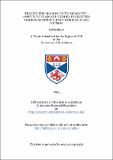Tracing the shadow of 'No mean city' : aspects of class and gender in selected modern Scottish urban working-class fiction
Abstract
This Ph.D. dissertation examines the influence of Alexander McArthur and H. Kingsley Long's novel No Mean City (1935) on the representation of working-class subjectivity in modem Scottish urban fiction. The novel helped to focus literary attention on a predominantly male, working-class, urban and realistic vision of modern Scotland. McArthur and Long explore - in their representations of destructive slum-dwelling characters - the damaging effects of class and gender on working-class identity. The controversy surrounding the book has always been intense, and most critics either deplore or downplay the full significance of No Mean City's literary impact. My dissertation re-examines one of the most disliked and misrepresented working-class novels in modern Scottish literary history. McArthur and Long's literary legacy, notwithstanding its many detractors, has become something to write against. Through examination of works by James Barke, John McNeillie, Edward Gaitens, Robin Jenkins, Bill McGhee, George Friel, William McIlvanney, Alan Spence, Alasdair Gray, James Kelman, Irvine Welsh, Janice Galloway, Agnes Owens, Meg Henderson and A.L. Kennedy, the thesis outlines how the challenge represented by No Mean City has survived the decades following its publication. It argues that contrary to prevailing critical opinion, the novel's influence has been instrumental, not detrimental, to the evolution of modern Scottish literature. Ultimately I hope to pave the way toward a fuller, more nuanced understanding of No Mean City's remarkable impact, and to demonstrate how pervasive its legacy has been to Scottish writers from the 1930s to the 1990s.
Type
Thesis, PhD Doctor of Philosophy
Collections
Items in the St Andrews Research Repository are protected by copyright, with all rights reserved, unless otherwise indicated.

